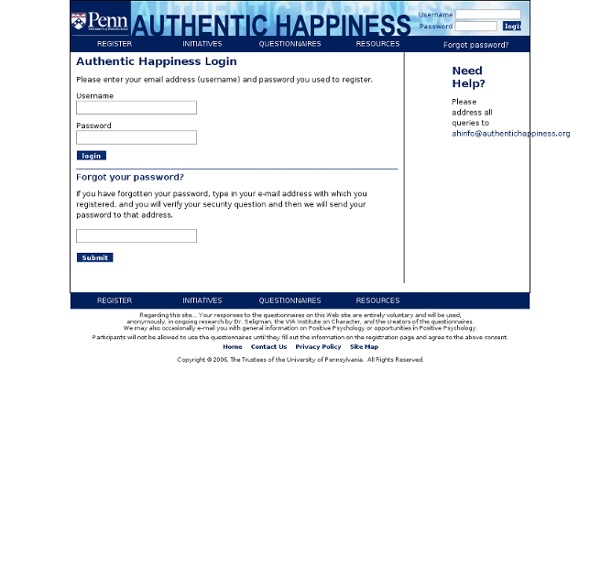



:: Authentic Happiness :: Using the new Positive Psychology The Happiness Project Toolbox Buro 24/7 Unexcited? There May Be a Pill for That The pills were either a placebo or a new drug called Lybrido, created to stoke sexual desire in women. Checking her computer, Miller pointed out gently that Linneah hadn’t been doing her duty as a study participant. Over the past eight weeks, she took the tablets before she planned to have sex, and for every time she put a pill on her tongue, she was supposed to make an entry in her online diary about her level of lust. “I know, I know,” Linneah said. She is a 44-year-old part-time elementary-school teacher, and that day she wore red pants and a canary yellow scarf. (She asked that only a nickname be used to protect her privacy.) Miller, a study coordinator, began a short interview, typing Linneah’s replies into a database that the medication’s Dutch inventor, Adriaan Tuiten, will present to the Food and Drug Administration this summer or fall as part of his campaign to win the agency’s approval and begin marketing what might become the first female-desire drug in America. “Low.” “Yes.”
Maslow's hierarchy of needs Maslow's hierarchy of needs, represented as a pyramid with the more basic needs at the bottom[1] Maslow's hierarchy of needs is a theory in psychology proposed by Abraham Maslow in his 1943 paper "A Theory of Human Motivation" in Psychological Review.[2] Maslow subsequently extended the idea to include his observations of humans' innate curiosity. His theories parallel many other theories of human developmental psychology, some of which focus on describing the stages of growth in humans. Maslow used the terms "physiological", "safety", "belongingness" and "love", "esteem", "self-actualization", and "self-transcendence" to describe the pattern that human motivations generally move through. Maslow's theory was fully expressed in his 1954 book Motivation and Personality.[5] The hierarchy remains a very popular framework in sociology research, management training[6] and secondary and higher psychology instruction. Hierarchy Physiological needs Safety needs Safety and Security needs include:
A Beautiful Mess I love using cloth napkins to dress up our dinner table, and through the years I've grown even more fond of their sustainability and cost effectiveness. Though, I'm not sure how cost effective it is if you keep buying more and more cloth napkins each year! This holiday season I thought it would be fun to look at how I could dress up the napkins I already own to give them an extra festive vibe. Check out three simple ways you can give new life to your table linens. Ribbon Trimmed Napkin This look is so (no sew) simple! Supplies:-ribbon-heat bond in width of ribbon-cloth napkin (buy mine here)-iron-fabric scissors (not shown above) Step One: Trim pieces of your ribbon to be about 1.5 inches longer than the width of your napkins. Step Two: Fold down the edges of each ribbon segment about 1/4" and iron flat. Step Three: Iron the heat bond to the ribbon (pressing with hot iron for two seconds), then peel off the paper backing. Pom-Pom Trimmed Napkin This is my favorite napkin style by far!
THE ECONOMICS OF HIGH-END PROSTITUTES PLASTIC FLOWERS AND MAWKISH SENTIMENTALITY | April 17th 2008 Lee Jordan/flickr The BBC is a national institution, supported by public funds. It has a duty to deliver public-service information. Special to MORE INTELLIGENT LIFE Last Sunday wasn't the most eventful one in world history. So what does the British Broadcasting Corporation pick on to lead its evening television news? Minute after minute--four or five, I'd guess, in a 20-minute bulletin--the report drags on, complete with (justifiably) sorrowing parents, the usual tributes (equally justified, let us trust) and the plastered-on solemnity of journalistic grief in which the BBC is now so expert. And this is the editorial judgment of a once-serious broadcasting organisation, still the premier news-gatherer in the land! If all this were an aberration on a news-thin Sunday, it wouldn't deserve comment. Now fair enough, people like me aren't the main audience that the BBC has to please. The BBC thinks it is.
H(appa)athon 123 Inspiration